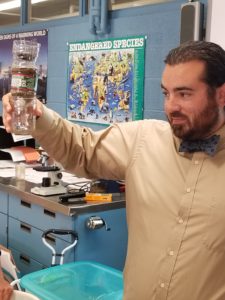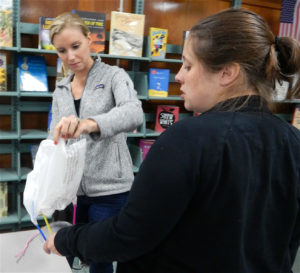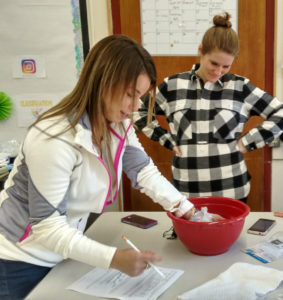Friday, May 31, 2019
For Immediate Release
Wade Institute for Science Education Provides Professional Learning for Teachers
Quincy, MA – The Wade Institute for Science Education worked with seven school districts to provide on-site, inquiry-based professional development for teachers over the 2018-2019 school year. Through Customized Professional Learning Services sessions that were designed in response to each schools’ identified needs, educators engaged in hands-on, minds-on learning, modeled the Science and Engineering Practices, and enhanced their repertoire of inquiry-based activities to address state learning standards in their classrooms.

Effectiveness
Research shows that the optimum professional learning is that which meets teachers where they are in their understanding, and the Wade Institute for Science Education’s Customized Professional Learning Services do just that. Education Specialists work with teachers and administrators to design and develop programs that bring science content and pedagogy that is place-based and responsive to schools’ professional development needs in implementing the vision of the 2016 Massachusetts Science and Technology/Engineering (MA STE) Curriculum Framework.

Schools and School Districts
During the 2018-2019 school year, the Wade Institute worked with these seven school districts: Acton-Boxborough Public Schools, Auburn Public Schools, Canton Public Schools, Dighton-Rehoboth Regional School District, Needham Public Schools, Norwood Public Schools, Walpole Public Schools, and Whittier Regional Technical High School.
In their session, Auburn Public Schools teachers were introduced to the inquiry process and its connection to the Science and Engineering Practices in the 2016 MA STE Standards. Participants engaged in hands-on, minds-on, inquiry-based investigations that brought the learning standards and practices into the classroom.
Teachers at Whittier Regional Technical High School furthered their understanding of the inquiry continuum by engaging in chemistry and environmental science hands-on, minds-on activities that modeled what the Science and Engineering Practices look like in the classroom.
Educators at Canton Public Schools participated in inquiry-based investigations that examined the progression of the Science and Engineering Practices and modeled inquiry-based science instruction. Education Specialists introduced grades K- 4 teachers to the progressions of the science and engineering practices from Kindergarten to eighth grade and then engaged teachers in physical science investigations through inquiry-based activities that focused on sounds and forces of motion.
During two sessions, Dighton-Rehoboth Regional School District teachers enhanced their repertoire of hands-on, minds-on investigations that use models to address state standards for grades PreK – 4.
Acton-Boxborough Public Schools elementary teachers refined their knowledge of the Disciplinary Core Ideas in physical science for grades K-5. Through three sessions, educators engaged in inquiry-based investigations that furthered their understanding of how teaching to physical science standards using the Science and Engineering Practices in all grade levels help to scaffold students’ learning in science.
Needham Public Schools’ middle school teachers explored the progressions of the disciplinary core ideas through elementary, middle and high school to gain a better understanding of their role in students’ development of concepts and understanding of science content. They explored the role of vocabulary in science instruction, explored using anchoring and investigative phenomena to build science units, and investigated how to assess inquiry-based instruction.
Over the course of five sessions, the Kindergarten through Grade 5 teachers in Walpole Public Schools engaged in investigations designed to enhance their use of the Science and Engineering Practices for instruction and began work on developing a district-wide curriculum. Their professional learning experiences varied by grade level and covered a wide variety of topics in physical, life, and earth and space sciences, engineering technology, and science literacy to address grade-specific curricular needs. The Wade Institute will continue its work with Walpole Public Schools this summer as teachers continue to build their science curriculum.
In their second year of Customized Professional Learning Services, Norwood Public Schools’ middle and high school teachers experienced the use of the Science and Engineering Practices for instruction. Teachers participated as students and reflected as educators on the implementation of inquiry-based investigations that modeled effective instruction for life, environmental, and physical sciences, as well as engineering design. Throughout the year, teams of teachers worked to develop and implement classroom investigations. The 2019 school season concluded with sharing of and reflection on their experiences with implementing the Science and Engineering Practices for instruction and assessment. During the 2019-2020 school year, the Wade Institute will continue to work with Norwood’s teachers.
Other schools and school districts with which the Wade Institute has worked include Dover/Sherborn Regional School District, Freetown-Lakeville Regional School District, East Longmeadow Public Schools, Melrose Public Schools, Springfield Public Schools, Stoneham Public Schools, Stoughton Public Schools, Swansea Public Schools, and Taunton Public Schools.

Benefits to teachers, schools, and school districts
Customized Professional Learning Services empower educators to engage students in effective inquiry-based science learning. They support districts’ initiatives that strengthen science instruction and assessment and to implement the 2016 MA Science and Technology/Engineering Framework using the Science and Engineering Practices. Sessions apply inquiry-based science instruction principles, model the use of the Science and Engineering Practices, and provide scientific content relevant to the Disciplinary Core Ideas.
Districts may collaborate with other districts to bring these professional learning opportunities to their teachers. Partnering with other schools fosters teacher collaboration, enriches the learning environment, and can make the professional development more cost effective. Summer opportunities are also available. For more information about the Wade Institute’s Customized Professional Learning Services, visit: https://www.wadeinstitutema.org/customized-school-services/
###
The Wade Institute for Science Education specializes in providing Inquiry-based, hands-on, minds-on, science, technology and engineering professional development for K-12 teachers and informal educators. For more information, visit www.wadeinstitutema.org or call 617-328-1515.
